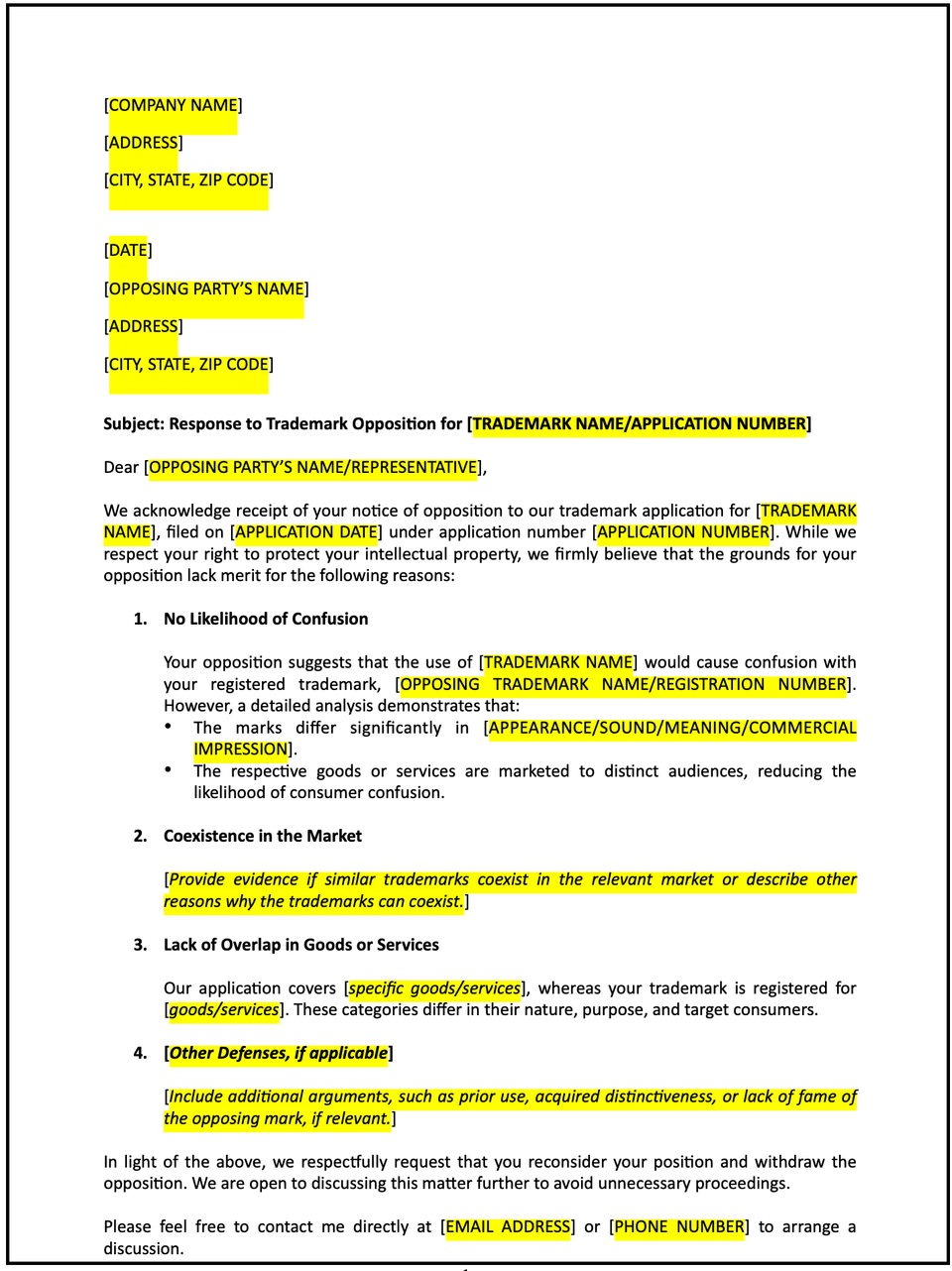Letter disputing trademark opposition: Free template

Letter disputing trademark opposition
A letter disputing trademark opposition is a formal communication used to contest an opposition filed against your trademark application. This letter outlines the basis for your disagreement with the opposition, provides evidence supporting your application, and requests the withdrawal of the opposition or proposes further discussion.
How to use this letter disputing trademark opposition
- Open with an introduction: Address the opposing party respectfully and reference the specific trademark application and opposition case.
- State the purpose: Clearly communicate your intent to dispute the opposition and outline your position.
- Reference the opposition: Include details of the opposition, such as case numbers, filing dates, and specific objections raised.
- Present your argument: Provide a reasoned explanation of why the opposition is unfounded, citing legal grounds, prior usage, or other relevant evidence.
- Include supporting documentation: Attach evidence such as usage records, market research, or legal precedent to bolster your case.
- Reaffirm your position: Emphasize your organization’s commitment to fair competition and adherence to trademark laws.
- Propose resolution: Suggest a discussion, mediation, or withdrawal of the opposition to resolve the matter amicably.
- Maintain a professional tone: Ensure the letter is clear, respectful, and focused on fostering a constructive dialogue.
- Provide contact information: Include details for the opposing party to respond or discuss the matter further.
Benefits of using a letter disputing trademark opposition
This letter ensures a structured and professional way to address trademark opposition while fostering transparency and resolution.
- Promotes clarity: Clearly articulating your position prevents misunderstandings and builds trust.
- Reflects professionalism: A well-crafted letter demonstrates respect and a commitment to resolving disputes constructively.
- Encourages resolution: Proposing next steps fosters a positive and cooperative dialogue.
- Builds credibility: Transparent communication reinforces your adherence to trademark regulations.
- Supports legal defense: Providing evidence and a reasoned argument helps strengthen your position in case of escalation.
Tips for writing an effective letter disputing trademark opposition
- Be specific: Clearly reference the opposition case, including details about the trademark application and objections raised.
- Use professional language: Maintain a respectful and constructive tone to foster collaboration.
- Provide context: Briefly explain your position and the rationale for your trademark application.
- Highlight mutual benefits: Emphasize the importance of resolving the opposition to avoid unnecessary legal expenses and maintain goodwill.
- Include actionable steps: Share instructions for next steps, such as scheduling a discussion or providing additional evidence.
- Keep it concise: Focus on the essential points while ensuring the tone is professional and engaging.
Frequently asked questions (FAQs)
Q: What details should I include in this letter?
A: Include references to the opposition case, your trademark application, and the reasons for disputing the opposition.
Q: Should I personalize the letter?
A: Yes, addressing the opposing party by name and referencing specific details demonstrates attentiveness and professionalism.
Q: Who typically sends this letter?
A: Legal teams, IP consultants, or business owners typically send this letter.
Q: How formal should this letter be?
A: The tone should be professional, respectful, and focused on fostering resolution.
Q: When should this letter be sent?
A: Send the letter promptly after receiving notice of the opposition to ensure timely communication.
Q: Can this letter include a counterproposal?
A: Yes, offering a counterproposal or compromise can help resolve the matter amicably.
Q: Is acknowledgment from the opposing party required?
A: While not mandatory, requesting acknowledgment ensures the recipient is considering your response and open to further dialogue.
This article contains general legal information and does not contain legal advice. Cobrief is not a law firm or a substitute for an attorney or law firm. The law is complex and changes often. For legal advice, please ask a lawyer.


